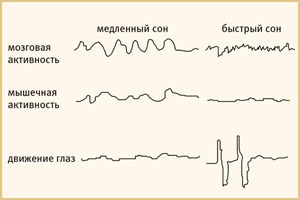Characteristic features of the slow phase of human sleep
A sleepy person often faces problems of poor health, lack of strength. It loses its efficiency, and the functionality of all body systems deteriorates. Night rest is a physiologically complex process. It consists of 5 constantly changing slow and fast phases. At this time, a person has time not only to relax, but also to rethink the information accumulated during the day. It is important for everyone to know what slow sleep is, since it is it that allows you to fully restore strength.
The first experiments on the study of night rest, as a physiological process, consisted in its interruption at a certain time. After that, the sensations of the subject were recorded. They made it possible to establish that night rest consists of phases that change sequentially. The first scientist to study sleep was A.A. Manasein. She determined that sleep at night is more important for a person than food.
In the 19th century, the scientist Kelschütter established that sleep is stronger and deeper in the first hours after falling asleep. Closer to the morning it becomes superficial. The studies became most informative after they began to use an electroencephalogram, which fixes the electrical waves emitted by the brain.
Distinctive features of slow sleep
The slow phase occupies about 85% of the total sleep volume. It differs from the fast rest stage in such features:
- Consists of 4 stages.
- At the moment of falling asleep, the movements of the eyeballs are smooth. At the end of the stage, they freeze.
- Dreams at this stage do not have a vivid plot. Some people may not have them at all.
- Violation of the phase of slow sleep is accompanied by irritability of a person, he gets up tired, cannot sleep. His performance is declining, his health is deteriorating. This happens due to the fact that not all neurochemical processes are completed.
- Breathing and pulse become slow, there is a decrease in blood pressure, body temperature.
- At this stage, complete relaxation of the muscles occurs.
Advice! As for REM sleep, a person wakes up at this stage without consequences for the body. There is an activation of all vital processes: increased heart rate, breathing. This rest phase is shorter.
The value of deep sleep
In order for a person to get enough sleep, he must rest properly. During slow sleep, the synthesis of growth hormone occurs, intensive cell repair. The body is able to relax well, renew the energy supply. At this stage, the rhythms of all brain structures are regulated.
An adult has the ability to restore his immune system. If you sleep correctly, a sufficient amount of time, then the metabolism and removal of toxins from the tissues of the body improves. In the phase of slow sleep, there is an active processing of the information received during the day, the consolidation of the studied material.
Elements that make up the orthodox phase
The NREM stage consists of several elements, which can be read about in the table:
| Element name | Characteristic |
|---|---|
| nap | In this time period, there is a revision and conjecture of ideas that appeared during the day. The brain tries to find a solution to the accumulated problems. There is a decrease in heart rate, respiration |
| sleep spindles | Here consciousness turns off, but these periods alternate with an increase in visual and auditory susceptibility. At this time, a person can be easily awakened. At this stage, the body temperature drops. |
| delta sleep | This phase is considered the transition to the deepest sleep. |
| deep delta sleep | During this period, a person may have dreams, his energy decreases. If you need to wake up, this process is a heavy stress for the body. Deep sleep occurs an hour and a half after the start of the first phase |
These stages have a certain percentage:
- Napping: 12.1%.
- Sleep spindles: 38.1%.
- Delta sleep: 14.2%.
- Deep delta sleep: 23.5%.
REM sleep takes up 23.5% of the total time.
Duration of the slow stage per night
Many users want to know how long NREM sleep should last per night to avoid sleep deprivation. This cycle begins immediately after the transition of the sleeper into unconsciousness. Then comes the deep phase. There is a disconnection of sensory perception, dulling of cognitive processes. Normally, the nap period can last 15 minutes. The last three stages take about an hour. The total duration of the slow phase (excluding alternation with REM sleep) is 5 hours.
 The duration of this period is affected by age. In a child, this phase lasts 20 minutes, in adults up to 30 years old - 2 hours. Further, it decreases: from 55-60 years old - 85 minutes, after 60 years - 80. Healthy rest should take at least 6-8 hours a day.
The duration of this period is affected by age. In a child, this phase lasts 20 minutes, in adults up to 30 years old - 2 hours. Further, it decreases: from 55-60 years old - 85 minutes, after 60 years - 80. Healthy rest should take at least 6-8 hours a day.
It should be noted that the rate of sleep per night for each person is different. Someone can sleep quickly and 4-5 hours will be enough for him, and 8-9 hours will not be enough for someone. Here you need to pay attention to your feelings.
It is important to know! The determination of the exact time required for a night's rest is made by trial. This will take 1-2 weeks. But we must not allow a permanent violation of the slow phase.
Human condition during deep sleep
At night, the deep stage will be accompanied by complete relaxation of the muscular system, the brain. The conductivity of nerve impulses changes, sensory perception is dulled. There is a slowdown in metabolic processes, the work of the stomach and intestines.
During this period, the brain requires less oxygen, blood flow becomes less active. A proper night's rest will be characterized by a slowdown in the aging process of tissues.
Reducing the slow phase: what is the danger
Depending on how long the slow phase of sleep lasts, a person will have good health and performance. Its reduction is fraught with serious health problems: the clarity of consciousness is lost, constant drowsiness appears. Regular disruption of the normal duration and structure of sleep leads to chronic insomnia. A person has the following problems:
- increased fatigue;
- immunity falls;
- irritability increases, mood changes frequently;
- metabolic processes are disturbed, mental functions and attention are dulled;
- the work of the endocrine system becomes problematic;
- increases the risk of developing diseases of the heart and blood vessels;
- performance, endurance decreases;
- insulin synthesis fails.

Attention! A decrease in the amount of sleep leads to the development of atherosclerosis, diabetes mellitus, and oncological pathologies. A comparative analysis showed that the slow and fast phases of night rest are equally important, although their characteristics will differ.
Regardless of whether a man or woman has a disturbed sleep structure, how much a person sleeps, if he does it wrong, then rest will not give the desired result. To improve its quality, you need to follow these recommendations of experts:
- Stick to a bedtime schedule. It is better to go to bed no later than 23 pm. At the same time, it is advisable to wake up no earlier than 7 in the morning (this indicator is individual).
- Before going to bed, you need to ventilate the room. The temperature in the bedroom should not exceed 22 degrees. To improve the quality of sleep, you can take an evening walk in the fresh air.
- A few hours before rest, you should not eat food that requires a long digestion time. In extreme cases, you can drink a glass of warm milk.
- Night rest should include the period after midnight until 5 am.
- It is strictly forbidden to drink coffee, strong tea or alcohol in the evening.
- If it is difficult for a person to fall asleep, then he can drink tea with soothing herbs (motherwort, valerian), take a relaxing bath with sea salt. Aromatherapy often helps to fall asleep.
- It is important to choose a comfortable position for relaxation.
- Preference should be given to orthopedic devices for rest. The mattress should be flat and firm. Do not use a high headboard.
- The room should be quiet and dark at night.
- After waking up, it is better to take a contrast shower or do light gymnastics.
A proper night's rest in compliance with its structure is the key to good health and well-being. A person wakes up rested, efficient, in a great mood. Systematic lack of sleep will lead to serious violations of the functionality of the body, which are not easy to get rid of.











